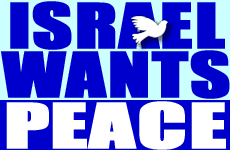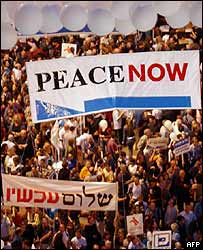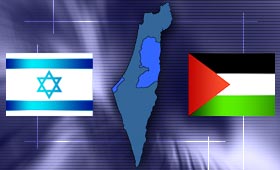Friday, June 02, 2006
Israel: Many Different People, One Nation
I am in the process of writing essays to get into graduate school, and this particular essay will not be able to be used, so I thought I would post it here. The essay is on my most significant cross-cultural experience, and of course the amount of words I could use was limited, or else I could speak on my Israel experience for pages and pages. I hope you enjoy it.
- - - - -
In late 1995, I had my most memorable cross-cultural experience when I moved to Israel and became a citizen. I had visited the country many times before this, but only upon immersing myself in the culture, did I really begin to understand the wide variety of cultures that comprised the Israeli community, and to question my own culture, values, and the preconceived notions instilled in me.
 It is a common notion that Israel is home to two separate and completely distinct people, but this isn’t the case. In reality, people from a wide variety of backgrounds have moved to the country in hope of sharing some of the rich history that accompanies the Holy Land. The two dominant entities, the Palestinians and Israelis, are each comprised of a wide variety of sub-cultures, each with their own issues, challenges, history and needs. However, the cultures have shared their history to such an extent as to make their futures intertwined, and bringing these diverse groups together to make one country.
It is a common notion that Israel is home to two separate and completely distinct people, but this isn’t the case. In reality, people from a wide variety of backgrounds have moved to the country in hope of sharing some of the rich history that accompanies the Holy Land. The two dominant entities, the Palestinians and Israelis, are each comprised of a wide variety of sub-cultures, each with their own issues, challenges, history and needs. However, the cultures have shared their history to such an extent as to make their futures intertwined, and bringing these diverse groups together to make one country.
When I first moved to Israel, I lived on a kibbutz, a communal living environment housing many distinct communities, most but not all Jewish, from a variety of locales around the world. These groups of people had abandoned inter-cultural conflicts, such as Russian vs. American or Orthodox vs. Secular, and pooled their resources to create a better life. This better life focused on living off of the land and creating a more beautiful place to live, but still centered on peaceful living in the Middle East.
 This was vastly different than life in Tel Aviv, a commercial center like so many big cities I had lived in. Jews, Muslims, Christians and others worked side by side, and met after work in the tea houses to discuss the most pressing political issues of the day. Israelis are forced to be cognizant of current events, and knowledge and understanding of these events comes not only from reading the papers and watching the news, but from communication with all people, regardless of religion, and hearing the different views on the events of the day that make up the complete picture.
This was vastly different than life in Tel Aviv, a commercial center like so many big cities I had lived in. Jews, Muslims, Christians and others worked side by side, and met after work in the tea houses to discuss the most pressing political issues of the day. Israelis are forced to be cognizant of current events, and knowledge and understanding of these events comes not only from reading the papers and watching the news, but from communication with all people, regardless of religion, and hearing the different views on the events of the day that make up the complete picture.
The fundamentalist Orthodox Jewish community I found in Jerusalem was far more insular than other communities I experienced in Israeli, but maintained similar goals as their more secular counterparts. They too strove for a better life based on a more peaceful and moral coexistence with their neighbors, and the morals they worship are identical to the morals valued in Islam and Christianity. Unfortunately, the Orthodox Jewish community focused so heavily on the steps necessary to attain this better society that they are unwilling to entertain the idea that others could take different steps to reach the same goal, and fear all outsiders. I suspect the same is true of the fundamentalist Muslim society, which I was unable to experience first hand.
 In the West Bank, I found the Palestinian communities to be warm and inviting, and never felt the danger that most Jews assume would be ever-present in the territories. The territories have been hit hard by the wars they’ve faced, and even the West Bank’s infrastructure has been reduced to rubble during Israeli occupation. But the Palestinian people are filled with hope, more so for their children than for themselves. They know that a better life is possible, and that it revolves around creating a peaceful coexistence with their neighbors, the Israelis. However, many Palestinians still feel the bitterness of Israeli occupation, and are unable to get past the disappointment of their broken dreams.
In the West Bank, I found the Palestinian communities to be warm and inviting, and never felt the danger that most Jews assume would be ever-present in the territories. The territories have been hit hard by the wars they’ve faced, and even the West Bank’s infrastructure has been reduced to rubble during Israeli occupation. But the Palestinian people are filled with hope, more so for their children than for themselves. They know that a better life is possible, and that it revolves around creating a peaceful coexistence with their neighbors, the Israelis. However, many Palestinians still feel the bitterness of Israeli occupation, and are unable to get past the disappointment of their broken dreams.
I was not able to experience all the different communities found in Israel, but it is clear to me from my seven years in Israel that a similar set of goals and values are shared by a variety of different communities there. The tumultuous history between the Palestinians and Israelis have masked these similarities, and caused a bitter rivalry, but the vast majority of people on both sides of this conflict want a peaceful coexistence based on a common morality. If only these cultures can get past the grievances of the past sixty years and begin communicating, both may find that a common goal of a peaceful coexistence is within reach, and Israeli society can once again be a religious country for people of all faiths.
technorati tags: Israel, Jewish, Muslim, Palestinian, Peace, Co-Exist
Posted by Scottage at 12:25 PM /
| |



 It is a common notion that Israel is home to two separate and completely distinct people, but this isn’t the case. In reality, people from a wide variety of backgrounds have moved to the country in hope of sharing some of the rich history that accompanies the Holy Land. The two dominant entities, the Palestinians and Israelis, are each comprised of a wide variety of sub-cultures, each with their own issues, challenges, history and needs. However, the cultures have shared their history to such an extent as to make their futures intertwined, and bringing these diverse groups together to make one country.
It is a common notion that Israel is home to two separate and completely distinct people, but this isn’t the case. In reality, people from a wide variety of backgrounds have moved to the country in hope of sharing some of the rich history that accompanies the Holy Land. The two dominant entities, the Palestinians and Israelis, are each comprised of a wide variety of sub-cultures, each with their own issues, challenges, history and needs. However, the cultures have shared their history to such an extent as to make their futures intertwined, and bringing these diverse groups together to make one country. This was vastly different than life in Tel Aviv, a commercial center like so many big cities I had lived in. Jews, Muslims, Christians and others worked side by side, and met after work in the tea houses to discuss the most pressing political issues of the day. Israelis are forced to be cognizant of current events, and knowledge and understanding of these events comes not only from reading the papers and watching the news, but from communication with all people, regardless of religion, and hearing the different views on the events of the day that make up the complete picture.
This was vastly different than life in Tel Aviv, a commercial center like so many big cities I had lived in. Jews, Muslims, Christians and others worked side by side, and met after work in the tea houses to discuss the most pressing political issues of the day. Israelis are forced to be cognizant of current events, and knowledge and understanding of these events comes not only from reading the papers and watching the news, but from communication with all people, regardless of religion, and hearing the different views on the events of the day that make up the complete picture. In the West Bank, I found the Palestinian communities to be warm and inviting, and never felt the danger that most Jews assume would be ever-present in the territories. The territories have been hit hard by the wars they’ve faced, and even the West Bank’s infrastructure has been reduced to rubble during Israeli occupation. But the Palestinian people are filled with hope, more so for their children than for themselves. They know that a better life is possible, and that it revolves around creating a peaceful coexistence with their neighbors, the Israelis. However, many Palestinians still feel the bitterness of Israeli occupation, and are unable to get past the disappointment of their broken dreams.
In the West Bank, I found the Palestinian communities to be warm and inviting, and never felt the danger that most Jews assume would be ever-present in the territories. The territories have been hit hard by the wars they’ve faced, and even the West Bank’s infrastructure has been reduced to rubble during Israeli occupation. But the Palestinian people are filled with hope, more so for their children than for themselves. They know that a better life is possible, and that it revolves around creating a peaceful coexistence with their neighbors, the Israelis. However, many Palestinians still feel the bitterness of Israeli occupation, and are unable to get past the disappointment of their broken dreams.